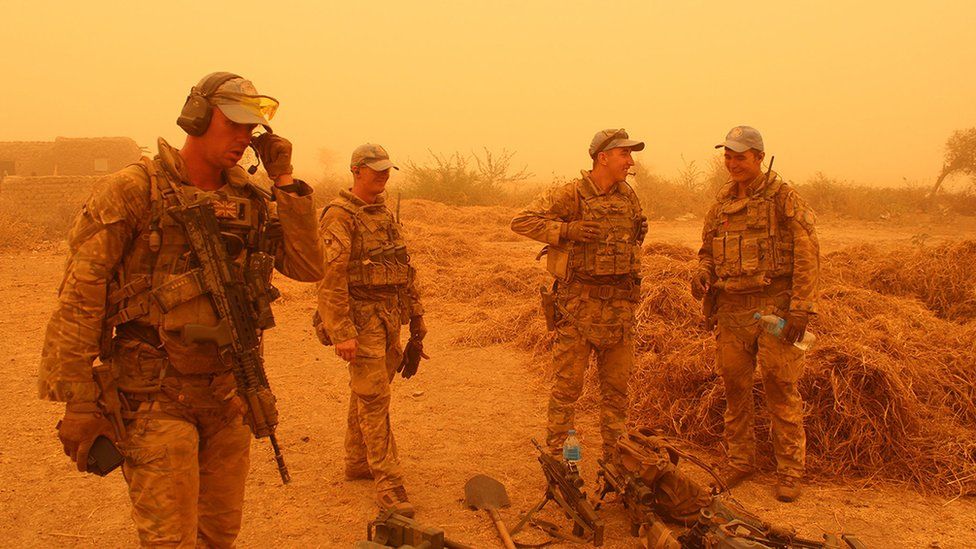ARTICLE AD BOX
 Image source, MoD
Image source, MoD
Earlier this year UK troops seized rifles and ammunition from suspected Islamic State in Mali.
The UK is withdrawing troops from Mali earlier than planned due to political instability in the country, Defence Minister James Heappey has said.
Since 2020 around 300 British soldiers had been in the country as part of a UN mission to protect the local population from Islamist extremism.
Mr Heappey said two coups in Mali in three years had "undermined" efforts.
He also attacked the current Malian government for working with the Russian mercenary group Wagner.
"The Wagner Group is linked to mass human rights abuses and the Malian government's partnership with the Wagner Group is counterproductive to lasting stability and security in their region," he told MPs.
The operation in Mali had been described as "the most dangerous peacekeeping mission in the world" and 288 UN soldiers have lost their lives there since 2013.
While in the region, British troops had conducted long-range reconnaissance patrols against Islamist militant groups in the area such as al-Qaeda and Islamic state.
The UK is the latest country to pull its troops from Mali, with France formally ending its decade-long presence last week.
French troops had been in Mali at the request of the then-government, however, since seizing power in 2020, Mali's military rulers have fallen out with France and have instead turned to Russia to help in their fight against Islamist insurgents who are wreaking havoc across much of the country.
There are widespread and credible reports that Russia's Wagner group of mercenaries has been helping Mali, although this has never been officially acknowledged by either Russia or Mali.
However, human rights groups have accused the Russians working with Mali's army of atrocities, such as the killing of around 300 civilians in April.
Meanwhile, the Islamist insurgency, which was the soldiers' justification for taking power has only got worse.
More than 4,000 people have been killed in the past year and many parts of the country are outside the control of Mali's military junta.
Britain's military withdrawal from Mali was inevitable. Once the French announced they were leaving their former West African colony it was unsustainable for the UK to maintain its small contingent, based in the remote town of Gao.
Taken together, the departure of western forces from this troubled Sahel nation is a setback for global counter-terrorism.
Ten years ago the French rushed in troops to successfully stop Al-Qaida from overrunning the capital.
David Cameron, Britain's PM at the time, vowed Britain would play its part to stop it becoming a wellspring for jihadist terrorism.
But a recent military coup has wrecked relations between Mali and the western nations trying to shore up its security. Mali's leaders have gone into partnership with Russia's Wagner mercenary group.
Not only are these former Russian soldiers accused of committing atrocities in Africa but Wagner have mounted an effective social media campaign to persuade local citizens to drive out the French.
Both the British and French governments are trying to put a brave face on this dire situation, saying they will continue to monitor the region from nearby countries like Niger.
But the truth is the West has lost the battle for hearts and minds in Mali and there is now a growing risk that the jihadists of the Islamic State group and al-Qaeda will exploit this situation to their own advantage.
Making a statement to the House of Commons, Mr Heappey said he was "saddened" to be pulling UK troops out of Mali, but insisted the government's commitment to the region remained "undiminished".
The minister said the UK would be meeting representatives from Europe and West Africa in Accra to co-ordinate their "renewed" response in the region.
He added that "responsibility for all of this sits in Bamako... two coups in three years have undermined international efforts to advance peace."
Mr Heappey told MPs that during his last visit to Mali he had "implored" the defence minister to see the value of the "international effort in his country" but that shortly after the Malian government began working with Wagner.
"This government cannot deploy our nation's military to provide security when the host country's government is not willing to work with us to deliver lasting stability and security."
He praised the work of UK troops as "outstanding" but said following the UK's experience in Iraq "we are clear that the military instrument should not be deployed on counterinsurgency or countering violent extremism missions unless there is a clear and compelling commitment towards political progress."

 2 years ago
18
2 years ago
18








 English (US)
English (US)